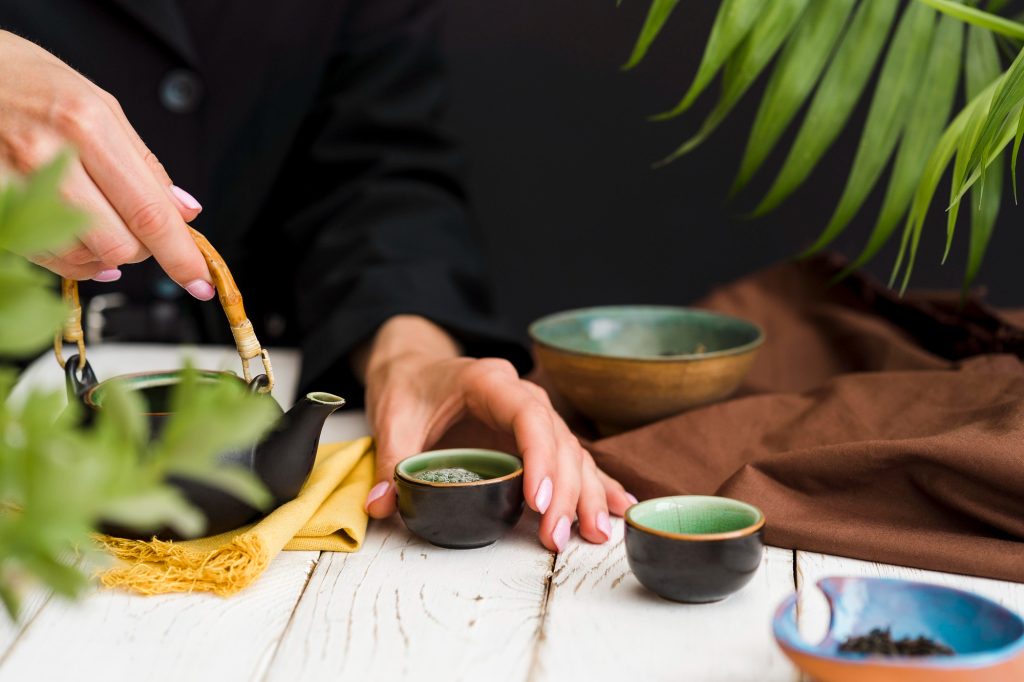Discover the power of natural and herbal remedies for postpartum back pain.
Exploring Natural and Herbal Remedies for Postpartum Back Pain

Being a new mom is a beautiful journey, but it can also bring along a few physical challenges. Postpartum back pain is one such discomfort that many women experience. While medication can provide relief, some new moms prefer exploring natural and herbal remedies to alleviate their discomfort.
Understanding Postpartum Back Pain
Postpartum back pain is a common condition that affects many new mothers. It can be caused by various factors, including pregnancy hormones, stress on the back during pregnancy, and changes in posture after childbirth. The pain usually starts within a few weeks after giving birth and can last for several months.
During pregnancy, a woman’s body goes through numerous changes to accommodate the growing baby. One of these changes is the production of relaxin, a hormone that relaxes the ligaments in the pelvis to prepare for childbirth. While this hormone is essential for the birthing process, it can also affect the ligaments and muscles in the back, leading to pain and discomfort.
Aside from hormonal changes, there are other factors that contribute to postpartum back pain. The physical strain of carrying and breastfeeding a newborn can put additional stress on the back muscles, causing them to become fatigued and sore. Lack of sleep, which is common for new mothers, can also exacerbate the pain as the body struggles to recover and heal.
Furthermore, poor posture while holding or lifting the baby can contribute to back pain. Many new mothers find themselves constantly bending over to tend to their little one, putting strain on the lower back. It’s important to be mindful of your posture and try to maintain a straight spine while performing these tasks.
Symptoms and Duration of Postpartum Back Pain
The intensity and duration of postpartum back pain can vary from woman to woman. Some may experience mild discomfort, while others may have severe pain that interferes with their daily activities. The pain may manifest as aching, stiffness, muscle spasms, or a combination of these symptoms.
For most women, the pain subsides within a few months as the body gradually recovers from childbirth. However, it’s important to note that for some women, the pain may persist for a longer period. This can be due to various reasons, such as the severity of the initial injury or the presence of underlying conditions.
If you are experiencing postpartum back pain, it’s crucial to listen to your body and seek appropriate care. While mild discomfort is common, severe or persistent pain should not be ignored. If the pain becomes unbearable or is accompanied by other symptoms like fever, numbness, or difficulty with bladder or bowel control, it’s best to seek medical advice to rule out any underlying conditions.
In the meantime, there are several measures you can take to alleviate postpartum back pain. Gentle exercises, such as pelvic tilts and gentle stretching, can help strengthen the back muscles and improve flexibility. Applying heat or cold packs to the affected area can provide temporary relief. Additionally, maintaining good posture and using proper body mechanics when lifting or carrying your baby can help prevent further strain on your back.
Remember, postpartum back pain is a common condition and with proper care and self-care, it can be managed effectively. Be patient with your body as it heals and don’t hesitate to reach out for support and guidance from healthcare professionals.
The Role of Natural Remedies in Pain Relief
Natural remedies can be a gentle and effective approach to managing postpartum back pain. Not only can they provide relief, but they also come with minimal side effects and are often more affordable than conventional medications.
Benefits of Natural Remedies
One of the primary benefits of natural remedies is that they work in harmony with your body. By utilizing the healing properties of nature, these remedies can help reduce inflammation, improve blood circulation, and promote relaxation. Unlike synthetic medications, natural remedies often have a holistic approach, addressing the root cause of the pain rather than just masking the symptoms.
In addition to their physical benefits, natural remedies can also support overall well-being. Dealing with postpartum back pain can be emotionally challenging, and incorporating natural remedies into your pain management routine can provide you with a sense of control and empowerment. Knowing that you are taking an active role in your own healing process can have a positive impact on your mental and emotional state.
Common Natural Remedies for Pain Relief
There are various natural remedies you can try to relieve postpartum back pain. One popular option is the use of warm compresses or heating pads. Applying heat to the affected area can help soothe sore muscles and improve blood flow, promoting faster healing. Additionally, the warmth can provide a comforting sensation, helping you relax and alleviate tension.
Gentle exercises like yoga or walking can also be beneficial in managing postpartum back pain. These low-impact activities can improve flexibility, strengthen your back muscles, and promote overall physical well-being. Engaging in regular exercise can also release endorphins, which are natural painkillers produced by the body, further enhancing your pain relief.
Another natural remedy worth considering is the use of topical creams or ointments. These products often contain ingredients like arnica or menthol, which have been known to provide temporary relief from muscle soreness and inflammation. When applied directly to the affected area, these creams can offer a soothing and cooling sensation, reducing discomfort and promoting healing.
It’s important to remember that every person is unique, and what works for one individual may not work for another. Therefore, it may take some trial and error to find the natural remedies that work best for you. It’s always advisable to consult with your healthcare provider before starting any new treatment, especially if you are currently taking other medications or have underlying medical conditions.
By exploring the world of natural remedies, you can discover a wide range of options to manage your postpartum back pain. From herbal remedies to alternative therapies, there are countless possibilities to explore. Embracing a holistic approach to pain relief can not only alleviate your discomfort but also enhance your overall well-being, allowing you to fully enjoy the precious moments of motherhood.
Herbal Remedies for Postpartum Back Pain
In addition to general natural remedies, herbal remedies have been used for centuries to alleviate pain and promote healing. These remedies harness the power of plants and herbs to provide relief.
Postpartum back pain can be a common issue for many new mothers. The physical strain of pregnancy and childbirth can take a toll on the body, causing discomfort and pain in the lower back. While there are various options available for pain management, herbal remedies offer a natural and holistic approach to relieving postpartum back pain.
Popular Herbal Remedies and Their Uses
Some popular herbal remedies for postpartum back pain include turmeric, ginger, and devil’s claw. These herbs possess anti-inflammatory properties that can reduce pain and swelling. Turmeric, a vibrant yellow spice commonly used in Indian cuisine, contains curcumin, which has been shown to have powerful anti-inflammatory effects. Ginger, known for its spicy and aromatic flavor, has long been used for its medicinal properties, including its ability to reduce pain and inflammation. Devil’s claw, a plant native to southern Africa, has been traditionally used to treat various types of pain, including back pain.
Chamomile tea and lavender oil also offer relaxation benefits and can help relieve muscle tension. Chamomile, a daisy-like flower, is often consumed as a tea and is known for its calming and soothing effects. Lavender, with its pleasant scent, has been used for centuries to promote relaxation and relieve muscle tension. Applying lavender oil topically or using it in a warm bath can provide soothing relief for postpartum back pain.
While these remedies are generally considered safe, it’s essential to consult with an experienced herbalist or naturopath to ensure appropriate dosage and to discuss any potential interactions with medications or pre-existing conditions. Each individual’s body is unique, and what works for one person may not work for another. Seeking professional guidance can help ensure the safe and effective use of herbal remedies.
Safety and Precautions When Using Herbal Remedies
While herbal remedies can be effective, it’s crucial to remember that they are not regulated like pharmaceutical drugs. This lack of regulation means that the quality and potency of herbal products can vary significantly. To ensure the safety and effectiveness of herbal remedies, it is important to purchase them from reputable sources. Look for products that have been tested for purity and potency.
When using herbal remedies, it is also important to follow recommended dosages. Taking more than the recommended amount can lead to adverse effects or interactions with other medications. It is always best to start with a low dose and gradually increase if needed, under the guidance of a healthcare professional.
If you have any concerns or experience unexpected side effects while using herbal remedies, it is important to seek advice from an herbalist or naturopath. They can provide personalized guidance and help address any issues that may arise.
Remember, herbal remedies should be used as a complementary approach to conventional medical care. If you are experiencing severe or persistent back pain, it is important to consult with a healthcare professional for a proper diagnosis and treatment plan.
Integrating Natural and Herbal Remedies into Your Routine
Now that you have a better understanding of natural and herbal remedies, let’s explore how you can integrate them into your daily routine to manage postpartum back pain.
Tips for Incorporating Natural Remedies
Start by incorporating gentle exercises, such as stretching or prenatal yoga, into your daily routine. These activities can help improve flexibility and strengthen your back muscles. You can also use warm compresses or take warm baths to relax tense muscles.
Additionally, make sure you are getting enough rest and practicing proper posture when lifting or carrying your baby. A supportive breastfeeding pillow or carrier can also help reduce strain on your back while nursing or carrying your little one.
How to Use Herbal Remedies Effectively
If you want to explore herbal remedies, it’s wise to consult with a herbalist or naturopath who can guide you on the appropriate herbs for your specific condition. They can help you create a safe and effective herbal regimen that complements your lifestyle.
Remember to always follow the recommended dosage and discontinue use if you experience any adverse reactions. It may take some time to notice the full benefits, so be patient and consistent with your herbal remedy routine.
Consulting with Health Professionals
While natural and herbal remedies can be beneficial, it’s essential to know when seeking medical advice is necessary.

When to Seek Medical Advice
If your postpartum back pain is severe, persists for an extended period, or is accompanied by concerning symptoms, it’s crucial to reach out to your healthcare provider. They can help determine the underlying cause of your pain and provide appropriate treatment options or referrals.
Working with a Herbalist or Naturopath
If you choose to explore herbal remedies, it’s essential to work with a qualified herbalist or naturopath. They have extensive knowledge of herbs and can help create a personalized approach to your postpartum back pain management. They can also ensure your herbal remedies do not interfere with any medications you may be taking.
Remember, your healthcare team is there to support you, so don’t hesitate to reach out and discuss your options.
Postpartum back pain can be challenging, but with the right approach, it can be manageable. By exploring natural and herbal remedies in conjunction with proper self-care and medical guidance, you can find relief and focus on enjoying this precious time with your little one.



